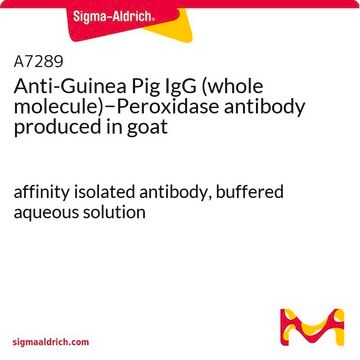B3528
BSK-H Medium
With sodium bicarbonate and HEPES, liquid, sterile-filtered, suitable for cell culture
Synonyme(s) :
BSK-H Medium Solution, Barbour-Stoenner-Kelly medium, Cell Culture Medium, Medium for Cell Culture
About This Item
Produits recommandés
product name
BSK-H Medium, With sodium bicarbonate, suitable for Borrelia burgdorferi (Qualified)
Niveau de qualité
Stérilité
sterile; sterile-filtered
Forme
liquid
Adéquation
suitable for Borrelia burgdorferi (Qualified)
Application(s)
food and beverages
Composants
NaHCO3: 2.2 g/L
glucose: 6.0 g/L (Dextro)
phenol red: 0.02124 g/L
HEPES: 6.0 g/L
Conditions d'expédition
dry ice
Température de stockage
−20°C
Application
Notes préparatoires
2. Prior to use, we recommend that the medium should be supplemented aseptically with prescreened, sterile-filtered serum to a final concentration of 6%. (See note below)
3. Other supplements may be added aseptically as desired. The nature of the supplement may affect storage conditions and shelf-life of the medium.
NOTE: For best results, serum used to supplement the medium should be prescreened for its ability to support the growth of Borrelia burgdorferi. Prescreened, sterilefiltered Rabbit Serum [Product No. R7136] is available from Sigma.
Produits recommandés
Souvent commandé avec ce produit
Supplément
Code de la classe de stockage
10 - Combustible liquids
Classe de danger pour l'eau (WGK)
WGK 3
Point d'éclair (°F)
Not applicable
Point d'éclair (°C)
Not applicable
Certificats d'analyse (COA)
Recherchez un Certificats d'analyse (COA) en saisissant le numéro de lot du produit. Les numéros de lot figurent sur l'étiquette du produit après les mots "Lot" ou "Batch".
Déjà en possession de ce produit ?
Retrouvez la documentation relative aux produits que vous avez récemment achetés dans la Bibliothèque de documents.
Notre équipe de scientifiques dispose d'une expérience dans tous les secteurs de la recherche, notamment en sciences de la vie, science des matériaux, synthèse chimique, chromatographie, analyse et dans de nombreux autres domaines..
Contacter notre Service technique



